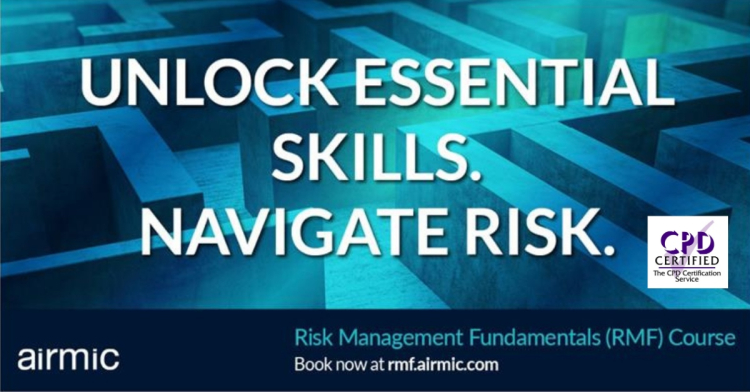Building risk maturity through education

Airmic’s Risk Management Fundamentals course aims to equip all professionals with the knowledge to think and act like a risk manager.
In an era when risks are multifaceted and interconnected, embedding a solid risk culture across the entire enterprise has never been more important. Even the most robust risk frameworks can falter if people across the organisation don’t share a common understanding of risk.
Across diverse functions, from front-line operations to insurance teams and the boardroom, a shared language and consistent approach to risk is therefore crucial to effective decision-making, according to Airmic’s head of learning, Adam Ireland:
“That is the driving principle behind our Risk Management Fundamentals (RMF) course. It’s about building foundational risk knowledge across all levels of an organisation – whether it’s professionals transitioning from insurance to risk, or for teams that are closely connected, like audit, compliance or HR.”
Building confidence and credibility
For Seb Horn, director of group risk management at Rentokil, whose insurance team operates across 89 countries, the importance of that shared understanding is clear. “I was very keen to put the more junior members of my team on the RMF because it’s really important they have a solid understanding of risk when they’re speaking to our businesses about risk and insurance,” he explains.
Horn stresses that while the board already has a strong grasp of risk – “there’s nothing more important than health and safety in our line of work” – extending education to operational functions ensures that, as he puts it, “everyone can think like a risk manager.”
Corey O’Leary, who joined MBDA with a strong insurance background, found the course equally valuable when he took on a more risk-focused role. “It helped me understand what other organisations do and what’s recommended as best practice. It gave me lots of practical takeaways for how we could be doing things differently or overcome particular challenges in a different way,” he says.
For O’Leary, the RMF course also highlighted the importance of a consistent risk appetite and top-down direction. “It showed me the importance of getting board buy-in – otherwise you’re constantly swimming against the tide,” he notes.
Strengthening the risk culture
The course offers a structured framework for understanding risk, but its impact extends beyond theory. Michelle Jeyes, risk and assurance officer at Wandle Housing Association, found it particularly helpful in her interactions with senior staff and board members:
“It gave me confidence to use the right terminology and know that my recommendations are grounded in a solid academic understanding of risk,” she says.
She also valued the practical tools she could apply immediately: “We learned about the emerging risk radar, which I’ve since incorporated into our reporting and scenario planning with the strategic team. It also helped lay the groundwork for a board away day on risk appetite.”
Formal risk education, as the RMF course demonstrates, is not just about compliance or internal procedure. It’s about equipping professionals across the business with the knowledge, language and confidence to act in line with risk best practice – ultimately building stronger, more mature risk cultures from the boardroom to the front line.
The next RMF courses take place January 27-28 (London), 18-20 February (virtual) and 19-20 March (London). Click here for more information and to book.
